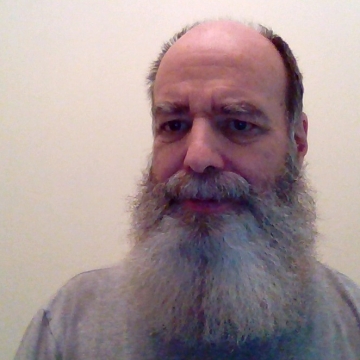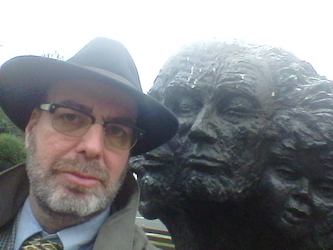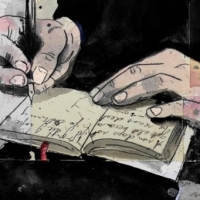If you’re like me, Election 2020 was just a wee bit disappointing. From the slow count of the vote and delayed declaration of the #BidenHarris win to the incredible disappointment of the Congressional elections. We’re down to the Georgia Senate run-offs as our last chance to re-take the Senate? We lost — LOST — seats in the House?!? Are you kidding me? Mith McConnell won? Lindsey Graham won? Susan Collins won? Joni Ernst won?
Weren’t we supposed to have a Blue Tsunami or wave or something? Instead it seems like the best we could do is stand in a puddle of our own piddle.
Don’t get me wrong, I’m overjoyed to have #BidenHarris in office and Trump out of office. I am relieved and am more and more relaxed as all of the attempts to steal the election fall by the wayside. But, but, but… Blue Tsunami!
How was it that I went into 3 November so sure that we were going to wash the mo’fo’s out of DC and take back state houses? Wasn’t the corrupt authoritarian Trump era going to be followed by a flowering American democracy? Weren’t we all going to be riding unicorns, holding hands, eating heart-shaped cupcakes, and singing Kumbaya as we rode across rainbow bridges? How could I be so wrong? Where did this impression come from?
The Associative Network, The Way We Represent Our World
How do we form impressions of the world? Without any effort or awareness, we stitch together a coherent picture of our world created out of associations with the objects, people, concepts, and ideas that we find around us. In short, the picture of our world is formed and maintained in an associative network.
We use this associative network, this model of our world, to tell us when we’re in danger, to determine normalcy, and to predict the future. Unfortunately, all three depend on how accurately our associative network models the world.
Obviously, the severe crippling defeat so many progressives felt after the election indicates that our model of the world didn’t accurately reflect the world. There were big errors. Where did those errors come from? We have several bad cognitive tendencies that contributed to our distorted world view: the mere exposure effect or illusory truthiness, difficulties with probabilities and uncertainty, and collective intelligence. And, when these are combined with our expanded hypothetical world created by social and mass media, then we can go off the rails real quick! Hello, election 2016, amirite?
Seeing is Believing
The Mere Exposure Effect
One of the truism of this network is that we believe what we see, hear, feel, or sense. This principle is called the mere exposure effect or the illusory truth effect and has been demonstrated in numerous studies. The basic study goes like this: You expose people to nonsense words in some sneaky underhanded way like putting them on the front page of a newspaper back when most people read the daily paper. Then a sample is gathered and people are shown a list of nonsense words and asked to rate them on their relative importance. The ones they had been exposed to are rated as being more important than the ones they weren’t exposed to, and the importance is proportionate to the amount of exposure. The words they were exposed to more frequently, are rated as being more important than the less frequently occurring words.
Evolutionary Psychology
It also makes sense from an evolutionary perspective. If we didn’t believe what our senses were telling us, we stood a good chance of being some lion’s dinner. Those of us who stood dithering over whether the rushing tawny blur was actually there or not, Berkeley be damned, were et and those doubting genes were removed from our gene pool.
It took millions of years for evolution to establish the bedrock of seeing is believing within mammals. And, we’ve had a few short thousand years to introduce abstraction and probabilities into our associative network. The results: they don’t fit well.
Probabilities, Uncertainty, and Predicting the Future
In the run up to the election, we get lots of predictions about what will happen. We see the results of numerous polls, listen to interviews with potential voters, hear the predictions of opinionated pundits, and read on our social media feeds. We believe all of these things. The mere exposure effect and the illusion of truthiness suggests that once we’ve heard that Amy McGrath and Jamie Harrison were polling ahead of their opponents, we believe it. When we listen to pundits predict the demise of the Republican party, we believe them.
Past is Prologue, Except When It isn’t
We’ve heard it a thousand times from pundits, every election is a reaction to the last election. But, we also predict the future based on what has happened in the past. If it was sunny and mild yesterday, it will probably be so today, climate change be damned!
We won big in the 2018 by-elections! We had suburban women sweeping us to victory around the country! Surely, that trend will continue, right? But, it didn’t. White women voted for Trump and Republicans by about 55%. So, there’s that.
Polling
Polling is the devil. When Jamie Harrison started polling ahead of Lindsey Graham, it didn’t mean that Harrison would win. It meant that if the election were held today and 100 times, he would win 50+ of the times, but Graham would still win 49- of the time (whatever the actual numbers were). But, what did we see? Harrison is ahead. And, that quickly became Harrison would win.
There weren’t no little conditional tags cautioning us about uncertainty in our associative networks. Harrison, we believed, would win. He was raking in tons of cash. The polling looked good. All of the metrics pointed to win.
No they didn’t. They pointed to an increased likelihood of a win. But, our hunter-gatherer brain can’t deal with hypothetical, conditional, probabilities, we see it, we believe it, and we walked away with, he’s gonna win.
Polling is cruel, y’all. Polling did me wrong, but I can’t quit it. I gots to have my polls during the election cycle. I can’t wait for the 2022 polls to come out!
The Pundits and News Websites
Pundits are paid to pundificate and they pundificate all over us before every election. It’s their job. No one ever keeps score on these yahoos. They predict, but who knows if they are right or wrong. So, when Larry Sabato makes a prediction, like Susan Collins is likely to lose her seat, we don’t remember all of the equivocating, we remember Susan Collins loses her seat. Since we want that to happen, we begin thinking about all the reasons she will: the millions donated to her opponent before she was nominated, the millions donated to her opponent after she was nominate, the neck-and-neck polling. See the way that works?
There has been a proliferation of those play with the turnout and demographics of the vote widgets on news websites. You know the ones that allow you to crank up the Black vote for #BidenHarris to 99% and the white non-college educated vote for #BidenHarris to 45% just to see what happens. You know what happens? Your brain thinks that shit is true. Those things are the devil. They will skew your predictions of the election every freaking time you use them. Don’t do it. But, they’re so much fun!
We just cannot deal with probabilities and uncertainty. We have to have concrete outcomes, not likely outcomes, so every prediction with a stipulated percentage likelihood automatically converts to definite. That’s the way it works unless you work damn hard at stopping it. Most of us just don’t want to work that hard.
Social Media and the False Consensus Effect
Our world, the one that exists inside our heads, is only a rough facsimile of the one that actually surrounds us. It is hard to determine what is true and what is not, especially when we don’t have direct experience with something. So, we rely on the beliefs of those around us to help us form our opinions and determine what we accept as true.
There is a more insidious cognitive tendency lurking here that makes it all much worse, the false consensus effect. We believe to our souls that our opinions, beliefs, and abilities are much more widely shared than they actually are.
I was so outraged by the needless death. misery, and suffering from #COVID19 that Trump and the Republicans had foisted upon us that I could not imagine that the rest of the country wasn’t equally outraged. Surely, they would vote out these brazen callous self-dealing characters?
I was so outraged by Trump’s blatant corruption, naked authoritarianism, and wanton anti-democratic tendencies that I couldn’t believe that the rest of the country wouldn’t turn their backs on them wholesale.
Obviously, 80 million of us did, but 74 million not only didn’t, they embraced it and lustily longed for four more years of the same.
My social media bubble helped reinforce this illusion of consensus by only exposing me to those who shared my view. It is easy to fall into the trap of believing that a reaction, belief, opinion is far more widely shared when all you see are people who share that belief, opinion, or reaction. And when reality rears its ugly head, deep disappointment in your fellow citizens results.
Well, we didn’t get no blue tsunami even though we thought we would. We were wrong. Unfortunately, we probably won’t learn from these mistakes because these cognitive tendencies are so deeply ingrained in our psyches. Being aware of these tendencies, though, and reminding ourselves that they are there and are likely leading us astray will help.
Become an Email Follower
You’ll be one of a dozen or so elite followers who will get an email with my latest posts. You’ll never miss a thing!
Image Attribution
“blue puddle” by gwilli is licensed under CC BY-NC-SA 2.0
Categories: Cognitive Psychology













The problem with polling is getting a sample accurately reflecting the pool of voters. If enough people from anybody one side are not part of the sample, the poll is not accurate.
LikeLiked by 1 person
Howdy RepubAnon!
And, that is one of the biggest problems with polling over the past four years. There are conservative voters who avoid pollsters and are beyond contact. Getting an adequate sample may not be possible any more.
Huzzah!
Jack
LikeLike
Beautifully expressed
Stay wealthy healthy safe and happy
LikeLiked by 1 person
Howdy Coach!
Thank you for your kind words. They are appreciated.
My apologies, your comment triggered the spam filter and it languished there until I checked the spam queue and rescued it. Glad I did.
Happy New Years to you and yours!
Huzzah!
Jack
LikeLiked by 1 person
Thanks for this very thorough analysis. I think expectations for the election depended on how deeply entrenched one was in their surrounding social bubble coupled with their propensity for skepticism.
I have many friends who believed Trump would win the first time. I wasn’t so sure. Then people thought the Mueller investigation was going to land like a bomb and blow Trump out of office. I completely didn’t see any evidence for that. Next it was the impeachment. People thought Trump’s dealings with Ukraine would be the slam dunk needed to kick him to the curb. Again, I felt strongly that for most Americans these ties were inconsequential. So, I was very worried last summer and into the fall as the election approached.
As you aptly pointed out, change doesn’t arrive quickly. Trends repeat. Regardless of who you listen to, the evidence was in. Republicans in Congress and across the country strongly backed Trump and Trump’s corrupt administration was doing everything it could get away with to suppress voter turnout.
We were told over and over that Democrats were largely mailing in their ballots. So on election night, I wasn’t surprised that Trump had a huge lead. I was surprised that all the broadcasters on MSNBC looked like they’d shared the same spoiled tuna salad for lunch.
It was a tough week that followed. I wasted hours updating that electoral map on my phone and extrapolating trends in every state’s blue and red vote counts. Happily, we won but as you’ve accurately pointed out we won by a disappointing and meager margin.
When conservatives complain that our media has a liberal bias, they are right. “Television journalism” is practically an oxymoron. That needs to change. I get news from a variety of sources both national and overseas. The foreign press covers the United States quite well and they have a refreshing objectivity that is hard to find here. In the weeks leading up to the election, the PBS Newshour had a variety of Republicans speak about their platform and campaign. Like pundits on all sides they were practiced speakers that spoke intelligently as they presented their reasons why their side had nothing to worry about.
I guess this rant is simply to say that people need to learn how to gather evidence and analyse it. American society values easy answers instead of skeptical inquiry. Social media might accelerate our gaze away from the big picture but the problem is that too many of us (including political experts) aren’t looking for the big picture to begin with.
LikeLiked by 1 person
Howdy Carol!
Your comment languished in the spam queue until I checked it. I don’t know why that would happen, but it did, so I’m sorry. That said, you make some good points about how we should all be analyzing information and getting it from a variety of places. We should is the operative phrase, there. Unfortunately, our neurological hardware is stacked against us. It isn’t laziness that causes us not to and only slightly explained by education. We just tend to cognitive shortcuts and many of them rely on our social group or those who are around us to give us direction. We tend to be drawn to “evidence” that confirms our assumptions. Those are just truism unless we do the hard work of resisting those trends, which is against our nature.
One of the big issues here is that the folks who lead the major networks are not dedicated to helping us do just that. In fact, they have the profit-motive driving them to enacting it and forming these media bubbles that feed the false consensus effect and confirmation bias by pre-filter the information they present and mixing opinion and “news.” Even the more traditional outlets fall victim to the deep culture of white privilege at the very least present only information that reinforces that bias in our culture. That makes for a new blog post.
I appreciate your thoughtful comment and am sorry it triggered the spam filter.
Huzzah!
Jack
LikeLiked by 1 person
No worries regarding a delayed reply. It seems to me that there are many societies where news sources are driven by similar market pressures yet they do a far better job of covering the world and producing largely unbiased content. Their citizens are better informed as a result and those who are familiar with our news media (especially TV) quickly recognize it shortcomings.
LikeLiked by 1 person
Howdy Carol!
I’m working on a large multi-part piece on the foundation of the deep culture of US being based on the Pilgrims and British culture and slavery arguing that the Civil War never really ended. I think that struggle about who gets to persecute who and holding slaves. Those are the original sins of America and we seem them playing out in multiple ways all around us, but especially in our news media.
Huzzah!
Jack
LikeLiked by 1 person
Interesting. I’ll look forward to reading.
LikeLiked by 1 person
Reblogged this on cabbagesandkings524 and commented:
Calico Jack – What happened to the big wave?
LikeLiked by 1 person
What is predicted (as certainty, consciousness of probability removed) always affects the outcome. So, the prediction of the Blue Tsunami became either a source of over-confidence for some, and of fear, loathing, and dread for others (“SOCIALISM!”). The result was a divided government election.
Politically (and often in religion too) the choices is between we are either the undoubted majority, or an oppressed minority. As far as I can see, only the “Christian” reactionaries (“conservatives”) have managed to see themselves as both at the same time. All our expectations of elections are colored by that choice of identity, which is not arrived at consciously.
LikeLiked by 1 person